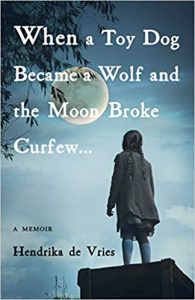A New Year’s Eve Miracle: Excerpt
May the New Year bring the “miracle” you wish for.
A New Year’s Eve Miracle.
We walked with deliberate steps.
Placed our feet with care
on the slippery surface
of the ice-covered sidewalks and bridges
of our Nazi-occupied town.
Held on to each other tight,
so not to slip and fall into the dark canal,
where thin ice would not hold
or protect the body of a seven-year-old
that could disappear in the stagnant water below.
A mother and her little girl,
barely visible in the winter’s dusk,
walked with purpose and determination
that last night of the year.
Two small human shapes
in a world swallowed up
by cruelties of war and hatred.
Obeying an inner need for
human contact and hope,
they risked the curfew of the oppressors
that had extinguished all light.
Heavy blankets of clouds clung
to the earth in dark layers,
shrouded its familiar landmarks.
No illumination eased the harsh
darkness of a desperate world.
No visible light guided the path.
Not from windows of homes
covered with war’s black out material.
Not from historic old lampposts
that stood powerless to help.
Their lights extinguished indefinitely
in a conquered city without power or heat.
No flashlight, no matches, no light permitted.
The powers of darkness in total control.
Mother and child continued with vigilance
along the treacherous path
that led to the ancient church
for the gathering in a communal prayer—
a plea for the end of hatred and oppression,
the return of human kindness and peace.
On this last evening of the year
they joined hands with neighbors and strangers,
united as one in a desperate last hope:
“Let there be an end to the war
in the coming New Year.”
The child would remember
the burning smell of tiny candles
held in the hands of wearied bundled-up adults.
Squeezed together in hard pews,
they beseeched a God
for a miracle with which to survive
the unknown months of dwindling food,
of hatred and violence that still loomed ahead.
A benediction ended the service.
The church doors opened.
The shuffling to the exit commenced.
Sounds, strange human sounds of
“Ahhh…Ohhh…and Ahhhh…,”
reached the little girl’s ears.
A lilting lifting symphony
of tired human voices awakened and in awe
sprang into words.
“A Miracle, a miracle, it’s a miracle!”
Lifted by the power of the human voices,
swept up by the throng that moved as one,
mother and child reached the large open doors.
The child blinked.
The Light almost blinding her eyes.
A brilliant full moon had pushed through the clouds
and touched the earth where she stood.
As if mocking the darkness,
the moon’s full round brilliance
lit up the landscape
with the light of high noon in the midst of day.
“A Miracle …a miracle,” the mother whispered.
The Light guided the mother and child’s steps
to find their way home with ease.
They reached safety before curfew,
avoided the threat of death
at the enemy’s hands.
“A miracle” the mother insisted
for the rest of her life.
Mother and child would have to endure
four more months of cold and starvation,
run for their lives on the Day of Liberation
in a mass shooting by Swastika-bearing men
who refused to accept defeat.
But Peace came.
And human warmth and decency
would restore the Light to the city of Amsterdam,
whose heart the Nazis had almost destroyed.
A miracle? perhaps…
On that New Year’s Eve,
on that particular night
in Amsterdam long ago,
a seven-year-old girl learned that
the powers of hatred, oppression and darkness
ultimately did not have the last word.
And deep inside her
the Light from the darkness
would grow and illuminate my life’s path
in the many long years that still lay ahead.
—Excerpted from Hendrika’s memoir:
When a Toy Dog Became a Wolf and the Moon Broke Curfew.
Hendrika de Vries is the author of When a Toy Dog Became a Wolf and the Moon Broke Curfew: a memoir about her childhood in Nazi-occupied WWII Amsterdam.
Her memoir has been awarded the 2019 May Sarton Women’s Book Award.
Read more on www.agirlfromamsterdam.com
WHEN A TOY DOG BECAME A WOLF AND THE MOON BROKE CURFEW

When a Toy Dog Became a Wolf and the Moon Broke Curfew, Hendrika de Vries (Author)
Born in the Netherlands at a time when girls are to be housewives and mothers and nothing else, Hendrika de Vries is a “daddy’s girl” until her father is deported from Nazi-occupied Amsterdam to a POW camp in Germany and her mother joins the Resistance.
In the aftermath of her father’s departure, Hendrika watches as freedoms formerly taken for granted are eroded with escalating brutality by men with swastika armbands who aim to exterminate those they deem “inferior” and those who do not obey.
As time goes on, Hendrika absorbs her mother’s strength and faith, and learns about moral choice and forced silence. She sees her hidden Jewish “stepsister” betrayed, and her mother interrogated at gunpoint. She and her mother suffer near starvation, and they narrowly escape death on the day of liberation. But they survive it all―and through these harrowing experiences, Hendrika discovers the woman she wants to become.
Buy the book HERE
Category: On Writing






























